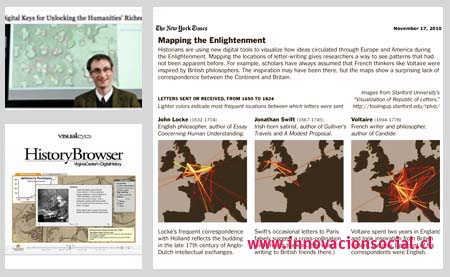Posts filed under ‘Digital Humanities’
Know your onions, why the digital humanities should give more relevance to the end-user
 Pic: Maite Otondo‘s graduate project at PUC
Pic: Maite Otondo‘s graduate project at PUC
During a Skype call we held with John Unsworth, dean of the graduate school of Library and Information Sciences of the University of Illinois at Urbana-Champaign he highlighted that one of the “missions” of library sciences should be to focus on the information retrieval. Yet, when he says this he indicates that it should be in more ambitious ways. When we deal with the retrieval of information we need to think in who is retrieving and what for.
Even though a humanities study the human condition, the digital humanities, generally, seems to pay little attention to whom they are framing information for. (more…)
DiRT-Open Source Digital Research Tools-Wiki
The Humanities are going through big changes. They no longer can stay confined to the “Analog World”. Acknowledging this situation, is that the Digital Research Tools Wiki [DiRT] project is built. The Wiki sets the platform to collect information and resources for conducting research within digital environments. It mainly indicates the use of open source tools that can enable the delivery of better and more creative ways to describe, interpret, analyze and display data specially for the humanities. WE LOVE OPEN SOURCE! Open source has various benefits, but one of the most relevant of them is the technological non-obsolescence derived from market constraints.
SOME OF THEIR TOOLS
Is Google making us stupid? How the Internet is changing us….
 Pic: Students playing video games at NCSU Library [CM]
Pic: Students playing video games at NCSU Library [CM]
There is a lot of information on the benefits of adopting new technologies. It is no surprise that the computer helps us manage cognitive loads or limitations that we have as humans. Computers could be considered cognitive artifacts, Norman says: “those artificial devices that maintain, display, or operate upon information in order to serve a representational function and that affect human cognitive performance.” [Norman 1991, p.17] But, today, are computing technologies really contributing to our cognitive skills? In his new book “The Shallows: What Internet is doing to our Brains” , Nicolas Carr places upfront the facts behind an early adoption of Internet. How Internet shapes human thought becomes evident. Are we losing our ability to read and think deeply because of the Internet?
 Pic: Apple Store NYC [CM]
Pic: Apple Store NYC [CM]
In May 2004, Wired Magazine published an article talking about how Internet rewired our brains. Experiments to monitor brain activity with an MRI, done by Gary Small [UCLA] p showed that Brain activity of the experienced surfers was far more extensive than that of the newbies, particularly in areas of the prefrontal cortex associated with problem-solving and decision-making. “Five hours on the Internet and the naive subjects had already rewired their brains,” Small (more…)
What is interaction? I mean, what is designing interactions?
 PIC: Robert Fabricant [Frog Design]
PIC: Robert Fabricant [Frog Design]
Discussion always arises when we talk about contested terminologies across disciplines. One of these is the term “interaction”. In a period when everybody is talking about designing interactions, we should ask ourselves from which disciplinary background is that person talking from.
In their essay “Multimedia” Geoffrey Rockwell and Andrew Mactavish, from the Digital Humanities, refer to the idea that multimedia is inherently interactive because it ‘Weaves the multiplicity into a whole’. According to them, computer programming in multimedial structures configure how the viewer will experience the relationship with a computer. Having multiple layers of experience grouped into one holistic interaction is one of the things that characterize multimedia.
Robert Fabricant – Behavior is our Medium from Interaction Design Association on Vimeo.
But in the design field: what do we mean with interaction? Nowadays, we could argue that interactions are not just happening in computers [Davis, 2008]. They have transcended. The new context definition for design, which makes it turn from technical to strategic, and the redirection of the role in design seeking to address systems instead of artifacts; gives us grounding to indicate that today designers are addressing social interactions.
THE CONFUSION BETWEEN REACTION & INTERACTION
In a broader sense, interactions are said to frame the relationship between people and a variety of artifacts like products & systems, which convey the aspect of function, which has always been part of design [Dubberly, Pangaro & Haque, 2009]. Interactions entail classic feedback loops that allow one system to modify the other and (more…)
Digital Humanities: The dialogue between the Geeks and the Poets
 PIC: NY Times
PIC: NY Times
Not long ago, the NY Times published the article: “Digital Keys for Unlocking the Humanities’ Riches”. The article mentions the technological exploration of data coming from the humanities under an alliance between what Patricia Cohen calls: The Geeks and the Poets. Upfront, Cohen faces the audience with a bold statement when using the word: unlocking. This idea is pretty strong. The knowledge coming from the humanities seemed to have been “locked”, being a privilege reserved for some savvy scholars.
Today, we live in an era where we, simple individuals, have become very sensible for information. And this seems to be an increasing trend for about fifteen years now. With the rise of the open source technologies and the availability of raw and public data on the net, every human has the right to take well-informed decisions. In another article from the NY Times “A Data Driven Life” Gary Wolf explores the idea of ordinary individuals getting interested in plain data. I make this link in order to intensify my idea that, today, broader audiences are interested in being well informed. This information can be personal tracking for taking decisions, or simply going to “shop” for information on the web. There is a phenomenon of “Data Democratization” happening and the humanities can’t be left behind. (more…)


